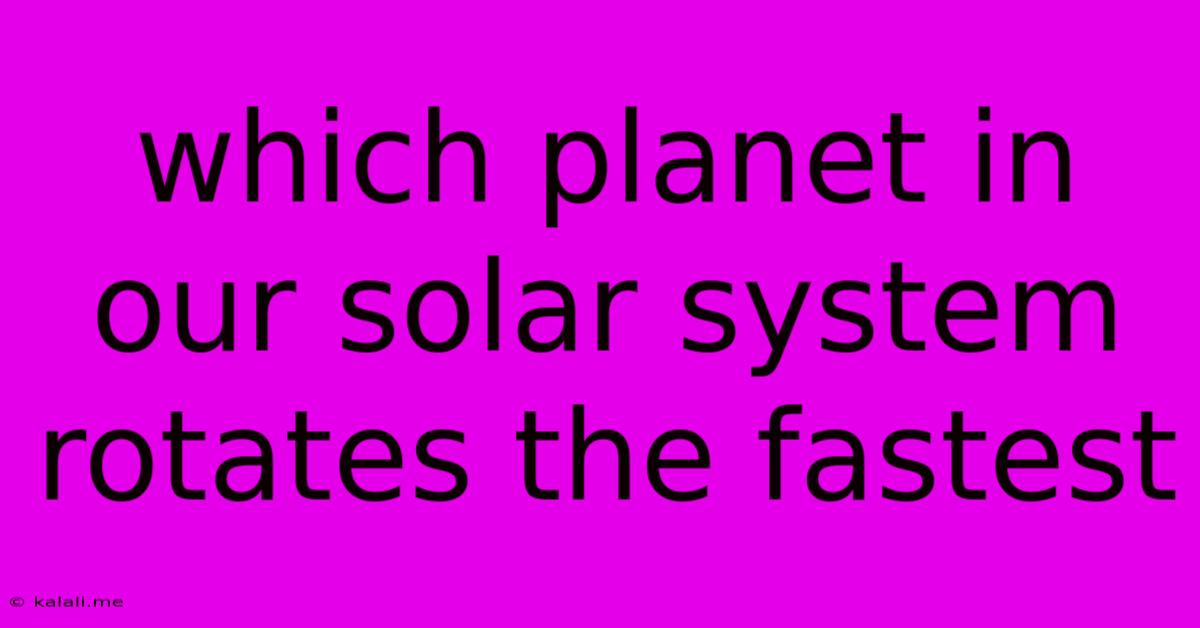Which Planet In Our Solar System Rotates The Fastest
Kalali
Jun 15, 2025 · 3 min read

Table of Contents
Which Planet in Our Solar System Rotates the Fastest?
Discover the speed demon of our solar system and understand the factors influencing planetary rotation. This article explores which planet boasts the fastest rotational speed, delving into the science behind this fascinating celestial phenomenon. We'll also touch upon the reasons why rotation speeds vary across the planets.
Our solar system is a fascinating place, full of diverse celestial bodies, each with unique characteristics. One such characteristic is the speed at which planets rotate on their axes. While we often think of planetary orbits, the speed of rotation is equally intriguing and plays a crucial role in a planet's climate and other features. So, which planet spins the fastest? The answer might surprise you.
It's Jupiter.
Jupiter: The Speedy Spinner
Jupiter, the largest planet in our solar system, also holds the title of the fastest rotator. This gas giant completes a full rotation on its axis in a mere 9.9 hours. That's incredibly fast, considering its immense size. To put it into perspective, Earth takes a leisurely 24 hours to complete one rotation. This rapid spin contributes to Jupiter's distinctive flattened shape – a noticeable bulge at its equator.
Factors Affecting Planetary Rotation Speed
Several factors influence how fast a planet rotates. These include:
-
Initial conditions: The initial angular momentum of the material that formed the planet plays a significant role. A higher initial angular momentum generally leads to faster rotation.
-
Collisions: Giant impacts during the planet's formation can drastically alter its rotation speed and even axis tilt. These collisions can either speed up or slow down a planet's rotation depending on the angle and force of the impact.
-
Mass distribution: A planet's mass distribution affects its rotation. A more concentrated mass near the equator tends to slow down the rotation compared to a more uniform mass distribution.
-
Tidal forces: The gravitational pull from other celestial bodies, particularly a large moon, can create tidal forces that gradually slow down a planet's rotation over long periods. This effect is particularly noticeable in Earth's slowing rotation due to the Moon's gravity.
Other Planets' Rotation Speeds: A Comparison
While Jupiter takes the crown for fastest rotation, let's briefly compare it to other planets:
- Saturn: Completes a rotation in approximately 10.7 hours.
- Neptune: Rotates once every 16 hours.
- Earth: Rotates once every 24 hours.
- Mars: Has a rotation period of roughly 24.6 hours.
- Venus: Surprisingly, Venus rotates incredibly slowly, taking about 243 Earth days to complete one rotation. This is likely due to the effects of past collisions or tidal forces.
- Mercury: Similar to Venus, Mercury also rotates relatively slowly, taking 59 Earth days for a single rotation.
Conclusion: A Spinning Solar System
Understanding the rotation speeds of planets provides valuable insights into their formation, evolution, and current characteristics. While Jupiter reigns supreme as the fastest-spinning planet, the diverse rotation rates across our solar system highlight the complex processes that shaped these celestial bodies. The differences in rotation periods underscore the unique histories of each planet and the influence of various gravitational and collisional events throughout their existence. Further research continues to unveil more details about these fascinating planetary dynamics.
Latest Posts
Latest Posts
-
35 Of What Number Is 91
Jun 15, 2025
-
How Do You Spell 18 In Words
Jun 15, 2025
-
Bliss Was It In That Dawn To Be Alive
Jun 15, 2025
-
The Magnetic Field Is Strongest When
Jun 15, 2025
-
What Is The Lcm Of 36 And 18
Jun 15, 2025
Related Post
Thank you for visiting our website which covers about Which Planet In Our Solar System Rotates The Fastest . We hope the information provided has been useful to you. Feel free to contact us if you have any questions or need further assistance. See you next time and don't miss to bookmark.